
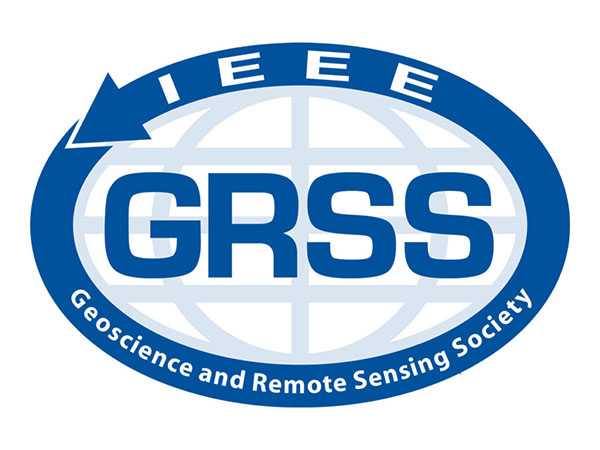
The IEEE Geoscience and Remote Sensing Society (GRSS) is proud to announce the Fifth GRSS Student Grand Challenge (SGC) in which student teams will have to develop an end-to-end remote sensing application based on unmanned vehicles (e.g. drones, remote controlled planes or helicopters, underwater vehicles, rovers, stratospheric balloons…).
- Fifth IEEE GRSS Student Grand Challenge
- Fourth IEEE GRSS Student Grand Challenge
- Important Dates
- Application and Selection Process
- Winners in the Fifth Student Grand Challenge
- Winners in the Fourth Student Grand Challenge
- Proposals in the Fourth Student Grand Challenge
- Third IEEE GRSS Student Grand Challenge
- Second IEEE GRSS Student Grand Challenge
- First IEEE GRSS Student Grand Challenges
- Contact Us
Fifth IEEE GRSS Student Grand Challenge
IEEE GRSS is an international professional Society that seeks to engage students and young professionals in contributing to the solution of complex engineering problems within the scope of the Student Grand Challenges. IEEE GRSS has in the past sponsored four previous Student Grand Challenges related to remote sensing based on drones or remotely piloted aircraft systems, nanosatellites payloads, and marine plastic litter monitoring.
Fourth IEEE GRSS Student Grand Challenge
IEEE GRSS is an international professional Society that seeks to engage students and young professionals in contributing to the solution of complex engineering problems within the scope of the Student Grand Challenges. IEEE GRSS has in the past sponsored three previous Student Grand Challenges related to remote sensing based on drones or remotely piloted aircraft systems, nanosatellites payloads, and marine plastic litter monitoring.
Important Dates
October 16, 2023 | Call for Proposals released on GRSS website | |
November 15, 2023 | Deadline for Submission Proposals | |
December 15, 2023 | Announcement and notification of participants | |
January 2024 | All teams present their projects for feedback | |
April 2024 | Preliminary Design Review | |
October 2024 | Critical Design Review | |
December 2024 – January 2025 | Submission of IGARSS 2025 extended abstracts | |
May 2025 | Final Design Review and Submission of IGARSS 2025 Final Papers | |
August 2025 | Attendance of IGARSS 2025 | |
October 2025 | Full Paper Submission to JSTARS |
Application and Selection Process
Teams willing to participate must send a brief description of their mission concept (< 10 pages), indicating:
Team’s composition (5-10 members and an endorsing professor), background and expertise, motivation, and signed commitment letter for the whole duration of the project (see below).
Scientific rationale and feasibility of the proposed innovative techniques (i.e. “ways to conduct the observations and detect the whales”) are welcome.
Development plan, including testing, during the whole duration of the project (1.5 years), compliant with the challenge timeline shown below.
Budget proposal: Budget can be higher, but the GRSS request is limited to USD $8,000. Eligible expenses may include AWS computational resources, and purchase of one computer.
If the proposing team is not yet part of an already established GRSS Student Branch Chapter, it is important that they commit to form a new Chapter by the end of 2024.
The proposing team must commit to attending 30-minute weekly meetings in order to provide status updates and receive management and technical input from GRSS.
A travel grant of up to USD $2,000 will be provided to one person per winning team to present their results at a special session at IGARSS 2025 in Brisbane, Australia.
Teams will be invited to submit their research work to JSTARS where their work will undergo the standard review process. Publication fees will be covered by GRSS in case of paper acceptance.
Teams are invited to submit their proposals before November 15, 2023, to: ieee.grss.4sgc@gmail.com indicating in the subject [4th GRSS Student Grand Challenge]. Proposals will be evaluated by the IEEE/GRSS SGC Steering Committee formed by Prof. A. Camps (UPC-Barcelona Tech, Spain), Prof. P. Gamba (U. Pavia, Italy), Dr. D. Kunkee (The Aerospace Corporation, USA), and Dr. T. Wang (JPL). Results will be announced on the GRSS website and by email to the participants by December 15, 2023.
Notes:
The IGARSS travel grant and the JSTARS publication fees waiver will be in addition to the USD $8,000, but are provided only to teams that commit to the project, attend the progress meetings regularly, and perform successfully.
All teams will retain all IP of their developments.
Teams that may not be familiar with some of the above terms are invited to check, for example: www.smartsheet.com/content/design-review-checklist-templates
Winners in the Fifth Student Grand Challenge
We are delighted to announce the winners of the Fifth IEEE GRSS Student Grand Challenge, focusing on “End-to-End Remote Sensing Applications Based on Unmanned Vehicles,” which was announced in October 2024. The challenge received an unprecedented 32 outstanding proposals, reflecting the growing interest and innovation in this field.
After careful evaluation, we are pleased to present the six winning teams (listed in order of submission):
1. Real-time Disaster Response with Edge AI on UAVs
Wuhan University, China
Led by Prof. Bo Du
2. Development of an Autonomous IoT-based UAV for Real-Time Detection and Mapping of Environmental Hazards in Remote Regions
The Federal University of Technology, Nigeria
Led by Prof. Joseph Sunday Ojo
3. HexaAgro: AI-Driven Hexacopter for Precision Pest Management and Eco-Friendly Agriculture
University of Engineering and Management, India
Led by Dr. Subhajit Das
4. Unlocking Forest Vital Signs: High Spatiotemporal VOD Mapping at Large Scales Fusing GNSS-T and LiDAR Data
University of Georgia, USA
Led by Prof. Mehmet Kurum
5. Unmanned System for Profiling Air Pollutants and Atmospheric Parameters: A Complete Framework for Onboard Processing and Real-Time Data Analysis
IIT Indore, India
Led by Dr. Saurabh Das
6. Innovative Nodes for Tracking Emissions and Guarding Remote Sensing Bands Integrity (INTEGRITY)
Universitat Politècnica de Catalunya, Spain
Led by Prof. Juan Ramos
The endorsing professors and student team leaders will be contacted shortly to commence project activities.
For more information about the challenge, please visit the IEEE GRSS website.
Winners in the Fourth Student Grand Challenge
1. Developing Image Processing and Image Classification Techniques for Detection and Tracking of Whales using Spaceborne Remote Sensing
Government Engineering College, Raipur(C.G), India
Dr. R. H. Talwekar
2. Enhancing Whale Tracking: Developing a Comprehensive Whale Detection Model using Satellite Imagery
University of Chinese Academy of Sciences, Huairou District, Beijing, China
Prof. Guoqing Li
3. Detection and Monitoring Whales Population and Migration from VHR Satellite Images using YOLOv8 Algorithm and Satellite Images Timestamp on a Mini-Computer
Telkom University, Bandung Regency, West Java, Indonesia
Prof. Edwar, S.T., M.T.
4. Image processing and classification techniques for detection and tracking of whales using space-borne remote sensing data
Velagapudi Ramakrishna Siddhartha Engineering College, Vijayawada, Andhra Pradesh, India
Prof. Dr S. Vasavi
5. Monitoring humpback whales in Colombia using Satellite Imagery
Universidad Distrital Francisco José de Caldas, Bogotá Colombia
Dr. Javier Medina and Dr. Erika Sofia Upegui Cardona
Accepted proposals will be announced in late December 2023.
Third IEEE GRSS Student Grand Challenge
The Third GRSS Student Grand Challenge targeted the detection of marine plastic litter. This challenge was conducted in collaboration with the Van Allen Foundation of the Université de Montpellier (France). Four student teams were selected from France, Spain, Portugal, and the US, using a number of different techniques from GNSS-R to hyperspectral imaging, optical radiometry and lidar fluorescence. Preliminary results were presented by one of the teams at IGARSS 2023 in Pasadena, USA.
Every year, around 338 million tons of plastic are produced globally. Much of this plastic ends up in the ocean, forming massive accumulations of plastic and microplastic particles that harm both human health and aquatic wildlife.
To combat this, the CAPTAIN project integrates satellite and in-situ measurements to identify and quantify oceanic plastic debris. Led by members of the Technical University of Catalonia and scientists at the Institute of Marine Sciences, the project has developed an instrumented Lagrangian buoy. This buoy drifts with ocean currents, monitoring plastic and fluorescent dissolved organic matter (FDOM), which signals plastic decomposition.
The buoy transmits real-time data via satellite, highlighting pollution hotspots and aiding targeted satellite remote sensing. Currently undergoing long-term testing near Barcelona, the buoy aims to refine its capabilities for future widespread use.

References
- Arii, M., Koiwa, M., Aoki, Y. Applicability of SAR to Marine Debris Surveillance After the Great East Japan Earthquake. IEEE J. Sel. Top. Appl. Earth Obs. Remote Sens. 7,
1729–1744 (2014). doi.org/10.1109/JSTARS.2014.2308550 - Biermann, L., Clewley, D., Martinez-Vicente, V., Topouzelis, K. Finding Plastic Patches in Coastal Waters using Optical Satellite Data, Nat. Scientific Reports 10, 5364 (2020). doi.org/10.1038/s41598-020-62298-z
- Lee, Y. K., Hong, S., Hur J., A fluorescence indicator for source discrimination between microplastic-derived dissolved organic matter and aquatic natural organic matter, Water Research, 207 (2021). doi.org/10.1016/j.watres.2021.117833
- Maximenko et al. Toward the Integrated Marine Debris Observing System, Front. Mar. Sci., 6, (2019). doi.org/10.3389/fmars.2019.00447
- Romera-Castillo, C., Pinto, M., Langer, T. M., Álvarez-Salgado X. A., Herndl G. J.,
Dissolved organic carbon leaching from plastics stimulates microbial activity in the
ocean. Nat Commun 9, 1430 (2018). doi.org/10.1038/s41467-018-03798-5 - Topouzelis, K., Papageorgiou, D., Karagaitanakis, A., Papakonstantinou, A., Arias Ballesteros, M., Remote Sensing of Sea Surface Artificial Floating Plastic Targets with Sentinel-2 and Unmanned Aerial Systems (Plastic Litter Project 2019). Remote Sens. 2020, 12, (2013).
Second IEEE GRSS Student Grand Challenge
The Second GRSS Student Grand Challenge aimed at developing Earth Observation payloads for nanosatellites. This challenge was conducted in collaboration with the National Space Science and Technology Center (NSSTC), Al Ain, United Arab Emirates (UAE). Three student teams were selected from Spain, Indonesia, and Japan. These payloads included an L-band microwave radiometer, a hyperspectral camera, an IoT communications system, and an RGB camera with an AI system to discard images covered by clouds. The 3-unit CubeSat and the 3 payloads developed were presented at IGARSS 2023 in Pasadena, USA. The current status of the satellite is in the final integration phase. The launch is planned for October 2024 on a Falcon-9 rocket. The mission includes payloads built by student teams from three international universities:

Universitat Politècnica de Catalunya, Spain, is developing an L-band radiometer for monitoring ice thickness and soil moisture, a hyperspectral camera for monitoring vegetation, and a software-defined radio for monitoring Radio Frequency Interference.
 Telkom University, Indonesia, is developing a multispectral camera and a miniature spectrometer for atmospheric sensing.
Telkom University, Indonesia, is developing a multispectral camera and a miniature spectrometer for atmospheric sensing.

- Kyushu Institute of Technology, Japan, is developing algorithms for onboard image classification to automatically detect the best quality images for downlinking.
Image 1 – AlainSat-1 team during the integration from left to right: Prof. Abdul-Hallim Jallad, Mr. Abdullah AlSalmani, Mr. Edwar (LOCANA team), Ms. Teana Mohamed, Mr. Adrián Pérez (RITA team), Dr. Yasir Abbas (ICU team), Mr. Mukesh Jha, Mr. Guillem Gràcia (RITA team), Mr. Amadeu Gonga (RITA team), and Mr. Hassan Al -Ali.
Image 2 – AlainSat-1 during the integration of the flight model.
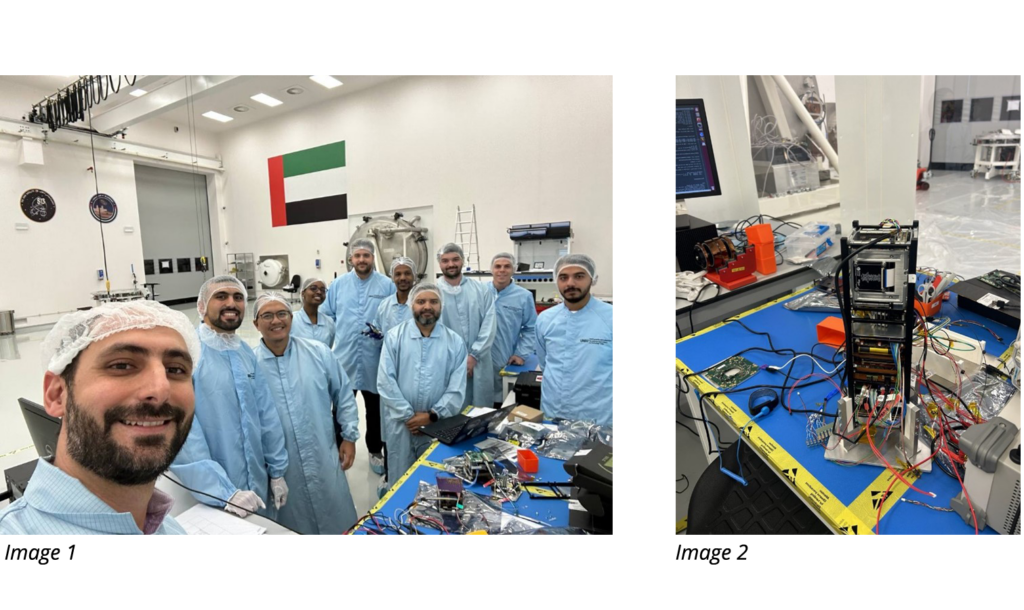
First IEEE GRSS Student Grand Challenges
The First GRSS Student Grand Challenge focused on the development of end-to-end remote sensing applications based on drones or remotely piloted aircraft systems. Five student teams were selected. Projects included a surveillance system for forest fire detection, a precision agriculture and forest monitoring system, a rice farm mapping system, a system to detect and geolocate disaster survivors, and a system to monitor glaciers. These projects were invited to present their results at IGARSS 2019 in Yokohama, Japan, in a dedicated session:
www.igarss2019.org/Papers/PublicSessionIndex3.asp?Sessionid=1375.
 .
. 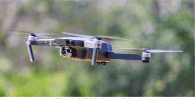
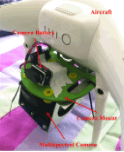 .
. 
The Second GRSS Student Grand Challenge aimed at developing Earth Observation payloads for nanosatellites. This challenge was conducted in collaboration with the National Space Science and Technology Center (NSSTC), Al Ain, United Arab Emirates (UAE). Three student teams were selected from Spain, Indonesia, and Japan. These payloads included an L-band microwave radiometer, a hyperspectral camera, an IoT communications system, an RGB camera with an AI system to discard images covered by clouds. The satellite launch is now scheduled for the second half of 2024. The 3-unit CubeSat and the 3 payloads developed were presented at IGARSS 2023 in Pasadena, USA:
2023.ieeeigarss.org/view_session.php?SessionID=1464 2023.ieeeigarss.org/view_session.php?SessionID=1465
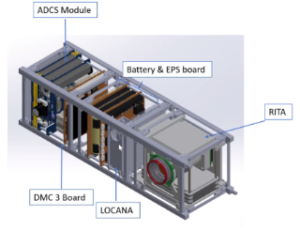
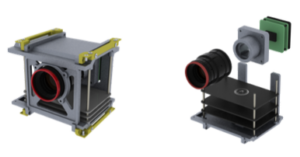
The Third GRSS Student Grand Challenge targeted the detection of marine plastic litter. This challenge was conducted in collaboration with the Van Allen Foundation of the Université de Montpellier (France). Four student teams were selected from France, Spain, Portugal, and the US, using a number of different techniques from GNSS-R to hyperspectral imaging, optical radiometry and lidar fluorescence. Preliminary results were presented by one of the teams at IGARSS 2023 in Pasadena, USA:
Questions and more information
If you have any questions about the IEEE GRSS Student Grand Challenges, please email ieee.grss.4sgc@gmail.com.
Submissions will only be accepted by email via ieee.grss.4sgc@gmail.com.
























 Telkom University, Indonesia, is developing a multispectral camera and a miniature spectrometer for atmospheric sensing.
Telkom University, Indonesia, is developing a multispectral camera and a miniature spectrometer for atmospheric sensing.
